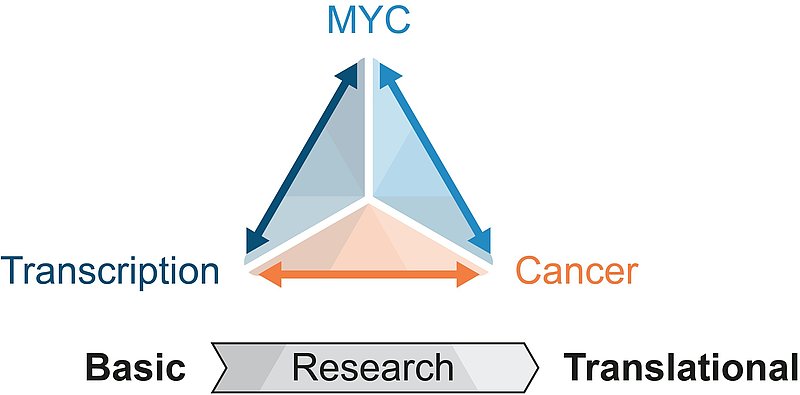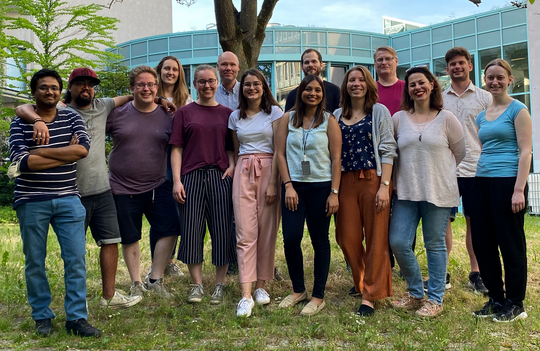AG Wolf
Contact

Prof. Dr. Elmar Wolf
Lehrstuhl für Biochemie und Molekularbiologie
Biozentrum
Am Hubland
97074 Würzburg
Raum B 311
Tel: 0931 31-83259
Fax: 0931 31-84113
elmar.wolf@biozentrum.uni-wuerzburg.de
Cancer Systems Biology
Lab News
October 2023
Congratulations to our team leader, Elmar Wolf, on his new position as Director of the Department of Biochemistry III in Kiel! Many of us will be going with you and are looking forward to building something new with you. The whole team whishes you all the best!
September 2023
Congratulations Ashwin for an excellent PhD defence! We wish you all the best for the future!
August 2023
Congratulations to our Master student Helen-Desiree for her successful defense! We whish you all the best for the future!
Congratulations to Lara Djokovic and our collaborators in the Dölken lab on their paper in Nature Communications on the role of the HSV protein ICP22 in host cell transcription.
May 2023
What a month in our group:
Congratulations Bikash for an excellent PhD defence! We wish you all the best for the future!
Same for our postdoc Mathias Diepold, who also successfully defended his PhD work in Sotriffer lab!
Last but not least - Congratulations also to Belinda for a great defence of her Master thesis.
Great work everyone and cheers to all of you!
Welcome to Maryam who started in our lab as a reasearch assistant!
April 2023
Femila is joining our team today - welcome, Femila, we hope you enjoy your time with us!
March 2023
Julia Wenzel joined our team for her master thesis - welcome, Julia!
January 2023
I am delighted and grateful to be awarded an ERC consolidator grant (#ERCCoG). In PROTAC-PDAC we will target oncogenic transcription factors in pancreatic cancer. I thank my research group, my colleagues in Würzburg and my many collaborators for their fantastic cooperation and help!
Our master students Marie and Katharina both successfully defended their work. Congratulations to both of you for a great thesis!
Our postdoc Mathias Diebold published his article about a covalently linked Aurora-A/MYCN complex. Congratulations, Mathias!
Archive
Research

In ageing Western societies tumors are becoming the most relevant medical problem. A key characteristic of tumors is deregulated signaling pathways that significantly alter the transcriptional profile of tumor cells. Proteins of the MYC family play a prominent role in this oncogenic reprogramming as transcription factors.
Our vision is to understand the transcriptional changes during carcinogenesis and, in particular, the oncogenic function of Myc to the extent that new pharmaceutical strategies for the fight against cancer can be developed on this basis. To this end, my research group uses genome- and proteome-wide methods to better understand the biology of tumors as well as genetic screens to find potential therapeutic targets of tumor cells. Together with our partners, we have recently developed substances that inhibit the function of Myc. In the next few years, we want to improve these molecules, of the PROTAC substance class, to such an extent that they can be clinically tested and applied.
Research topic 1: The oncogenic function of MYC
Research topic 2: Investigation of transcriptional elongation
Research topic 3: New pharmaceutical concepts in oncology
Publications
2022/2023
Djykovic K, Henning T, Reinisch K, Milic A, Whisnant AW, Wolf K, Weiß E, Haas T, Grothey A, Jürgens CS, Kluge M, Wolf E, Erhard F, Friedel CC, Dölken L* (2023) The HSV-1 ICP22 protein selectively impairs histone repositioning upon Pol II transcription downstream of genes. Nature Communications doi: 10.1038/s41467-023-40217-w
Daniel Solvie, Apoorva Baluapuri, Leonie Uhl, Daniel Fleischhauer, Theresa Endres, Dimitrios Papadopoulos, Amel Aziba, Abdallah Gaballa, Ivan Mikicic, Ekaterina Isaakova, Celeste Giansanti, Jennifer Jansen, Marvin Jungblut, Teresa Klein, Christina Schülein-Völk, Hans Maric, Sören Doose, Markus Sauer, Petra Beli, Andreas Rosenwald, Matthias Dobbelstein, Elmar Wolf*, Eilers* (2022) MYC multimers shield stalled replication forks from RNA polymerase. Nature doi: 10.1038/s41586-022-05469-4.
Otto C, Kastner C, Schmidt S, Uttinger K, Baluapuri A, Denk S, Rosenfeldt MT, Rosenwald A, Roehrig F, Ade CP, Schuelein-Voelk C, Diefenbacher ME, Germer CT, Wolf E, Eilers M, Wiegering A (2022) RNA polymerase I inhibition induces terminal differentiation, growth arrest and vulnerability to senolytics in colorectal cancer cells. Mol Oncol
Schwarz JD, Lukassen S, Bhandare P, Eing L, Snaebjörnsson MT, Cruz García Y, Kisker JP, Schulze A, Wolf E (2022)The glycolytic enzyme ALDOA and the exon junction complex protein RBM8A are regulators of ribosomal biogenesis. Frontiers in Cell and Developmental Biology doi: 10.3389/fcell.2022.954358
Bozilovic J, Eing L, Berger BT, Adhikari B, Weckesser J, Berner NB, Wilhelm S, Kuster B, Wolf E*, Knapp S* (2022) Novel, highly potent PROTACs targeting AURORA-A kinase. Current Research in Chemical Biology 2, IF: N/A
Doffo J, Bamopoulos SA, Köse H, Orben F, Zang C, Pons M, den Dekker AT, Brouwer RWW, Baluapuri A, Habringer S, Reichert M, Illendula A, Krämer OH, Schick M, Wolf E, van IJcken WFJ, Esposito I, Keller U, Schneider G, Wirth M. NOXA expression drives synthetic lethality to RUNX1 inhibition in pancreatic cancer. PNAS. 2022, 119(9).
Riedel A, Helal M, Pedro L, Swietlik JJ, Shorthouse D, Schmitz W, Haas L, Young T, da Costa ASH, Davidson S, Bhandare P, Wolf E, Hall BA, Frezza C, Oskarsson T, Shields JD. Tumor-Derived Lactic Acid Modulates Activation and Metabolic Status of Draining Lymph Node Stroma. Cancer Immunol Res. 2022, 10(4):482-497
Schick M, Zhang L, Maurer S, Maurer HC, Isaakaidis K,Schneider L, Patra U, Schunck K, Rohleder E, Hofstetter J, Baluapuri A,Scherger AK, Slotta-Huspenina J, Hettler F, Weber J, Engleitner T, Maresch R,Slawska J, Lewis R, Istvanffy R, Habringer S, Steiger K, Baiker A, OostendorpRAJ, Miething C, Lenhof HP, Bassermann F, Chapuy B, Wirth M, Wolf E, Rad R, Müller S, Keller U (2022)Genetic alterations of the SUMO isopeptidase SENP6 drive lymphomagenesis andgenetic instability in diffuse large B-cell lymphoma. Nature Communications 13













